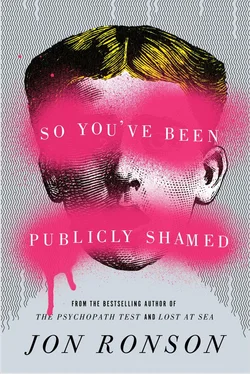—
Mike Daisey’s transgression — which was remarkably similar to Jonah’s — had been uncovered three months before Michael Moynihan lay on his sofa that July Fourth and wondered when Bob Dylan had ever called the creative process “just the sense that you got something to say.” Like Jonah and Stephen Glass, Mike Daisey had been caught lying in a story. His was about a trip he had just taken to Shenzhen, China, during which he met factory workers who made Apple products. But some of the meetings had never happened. His shaming was maybe even more agonizing than Jonah’s because every breath of it — every long, panicked silence — was captured on audio and broadcast on one of America’s most popular radio shows, This American Life . Mike Daisey has always been a dandy. He was a big, loud, flamboyant character in New York’s theater world. And for much of the broadcast, he sounded like he thought he could bluster his way through it. He had hope. He made justifications and nitpicked little points. But as the hour unfolded, it all crumbled, and by the end, when he finally said, “I’m sorry,” he sounded finished — exhausted, empty. It was such an agonized “I’m sorry” that I thought there was a chance he would leave the radio studio, go home, and kill himself. But instead, within minutes, he published an apologetic statement on his website, and by the next day, he was back on Twitter. He was one man screaming at ten thousand people screaming at him. He berated and scolded his attackers and called them hypocrites. At first, all this made them even more incensed. But he didn’t budge. He was a tireless defender of himself.
Eventually, it became clear to his critics that their fury was useless. They drifted away, until it all just stopped. And now, as Jonah Lehrer roamed the Los Angeles wilderness shattered and disgraced, Mike Daisey posted photographs on Instagram of him and his wife sunbathing poolside in Miami, having just completed a critically acclaimed sold-out theatrical tour. How could almost identical shamings annihilate one man and leave another without a scratch?
—
In the restaurant, Mike didn’t reply to these questions right away. Then he said, “When I was young, twenty-one, twenty-two, my life fell apart in a really catastrophic way.”
He had been staring down at the table. But now he looked up. “My girlfriend had suddenly started avoiding me,” he continued. “I’d be, ‘Let’s get together.’ But she always put me off. And finally I got a phone call. She was pregnant. Eight months pregnant. I was going to be a father. In a month.”
This was in far northern Maine, Mike said. He felt trapped. In Maine. The baby was born. Their relationship disintegrated under the strain. “I abdicated my responsibilities as a father. I completely fell apart.”
Every night Mike would go swimming in a lake. Some nights he swam out as far as he could. “I kept going. It got colder and colder. And I’d just lie in the lake. And I was trying, it’s really clear now, I was trying to drown.”
“You were trying to kill yourself?”
Mike nodded. “This is really clear to me now.” He paused. “Ever since, I’ve never felt as tethered to this place as other people do. Everything seems like a long, improbable afterlife.” Mike smiled. “I bring it up because it might be useful for you,” he said.
We carried on eating. The story just hung there. I think Mike was treating me like an audience, feeding me fragments of stories, forcing me to piece together the mystery myself.
He swam back to shore each night. He ended up teaching high school drama. He graduated a year late. Then he left Maine. “I drove to Seattle,” he said. “I tried to create a new life for myself.” And he did. He became, of all things, a monologist in the theater. His shows were passionate and well liked but too esoteric to make a splash outside his fringe world. They were about esoteric things like how war had turned his grandfather cold and how that coldness had trickled down to turn his father cold. And so on. But then, in the summer of 2010, he performed his masterpiece— The Agony and the Ecstasy of Steve Jobs —the story of his trip to China.
The factory workers he met there told him about the n-hexane: “N-hexane is an iPhone screen cleaner,” Mike’s monologue went. “It’s great because it evaporates a little bit faster than alcohol does, which means you can run the production line even faster and try to keep up with the quotas. The problem is that n-hexane is a potent neurotoxin, and all these people have been exposed. Their hands shake uncontrollably. Most of them… can’t even pick up a glass.” His monologue moved on to describe his meetings with thirteen-year-old girls who worked at the plants because nobody checked ages, and the old man with the right hand that was “twisted up into a claw. It was crushed in a metal press at Foxconn.” Mike showed this old man his iPad. “He’s never actually seen one on, this thing that took his hand. I turn it on… the icons flare into view. And he strokes the screen with his ruined hand. And he says something… He says, ‘It’s a kind of magic.’”
One night at the end of 2011, This American Life ’s creator, Ira Glass, saw Mike Daisey perform his show onstage at Joe’s Pub in New York City. Like everyone else, he was spellbound, and so he offered Mike the chance to tell it on his program. The people at the show tried to fact-check. They asked Mike to put them in touch with his translator. But Mike said his phone number for her no longer worked. Some of his other facts had checked out, so they took his word for it.
—
I heard it go out live. I was driving through Florida. I pulled my car onto the side of the road and didn’t move until it had finished. People all over America were doing the same. We felt inexorably altered by the power of Mike’s narrative and became determined to take action. Most of us, it goes without saying, were inexorably altered back to how we’d been earlier that day by the time we’d had dinner or whatever. But some weren’t. One listener started a petition calling for better working conditions at Apple’s manufacturing plants. He delivered 250,000 signatures. Pressure was put on the company like never before. It announced that, for the first time in its history, it would allow third parties in to audit the factory conditions. The Mike Daisey episode became the single most popular podcast in This American Life ’s history.
But unbeknownst to Mike, his own Michael Moynihan was quietly digging.
He was Rob Schmitz, the Shanghai correspondent for the public radio show Marketplace . Some of Mike’s details had seemed suspicious to him. For instance, Mike had mentioned interviewing factory workers in a Starbucks. How could they afford that? Starbucks is even more expensive in China than in the West. So he tracked down Mike’s translator. And that’s when Mike’s story fell apart. There were no workers with hands that shook uncontrollably, no old man with a clawed hand. He hadn’t visited “ten” plants in China. He’d visited three. And so on. It wasn’t that the horrors Mike described hadn’t happened — they had. One hundred thirty-seven workers at an Apple plant had been sickened by n-hexane, but it had happened in 2010 and a thousand miles away, in a town called Suzhou. (In Apple’s February 2011 annual report, the company described the use of the toxic chemical as a “core violation” of worker safety and said it had ordered the contractor to stop using n-hexane.) Mike hadn’t met these Suzhou workers. He’d only read about them. It just made his story more enthralling to pretend he was there.
And so, on March 16, 2012, Ira Glass brought Mike Daisey back on the air.
IRA GLASS:Were you afraid that we would discover something if we talked to [the translator]?
Читать дальше












